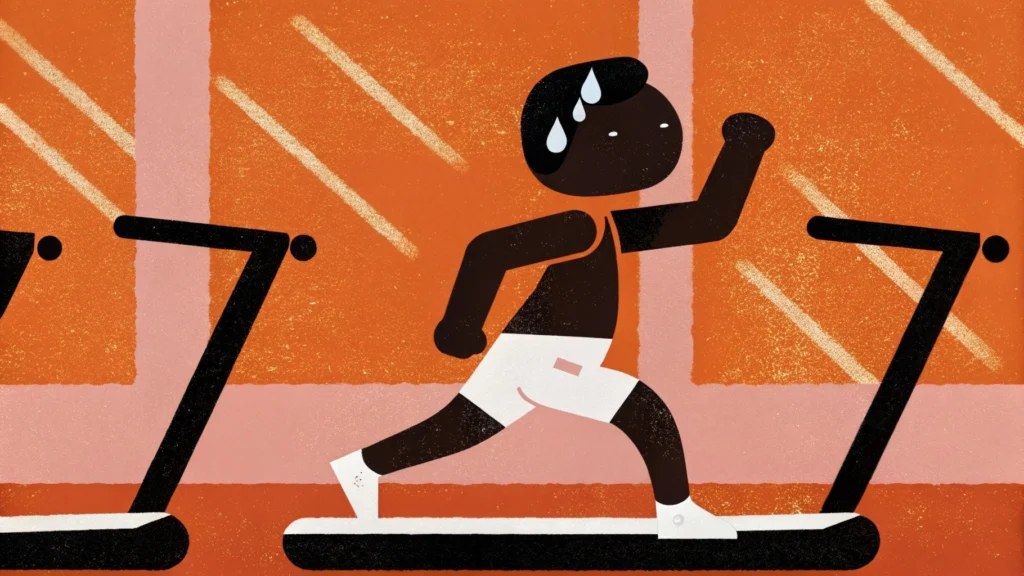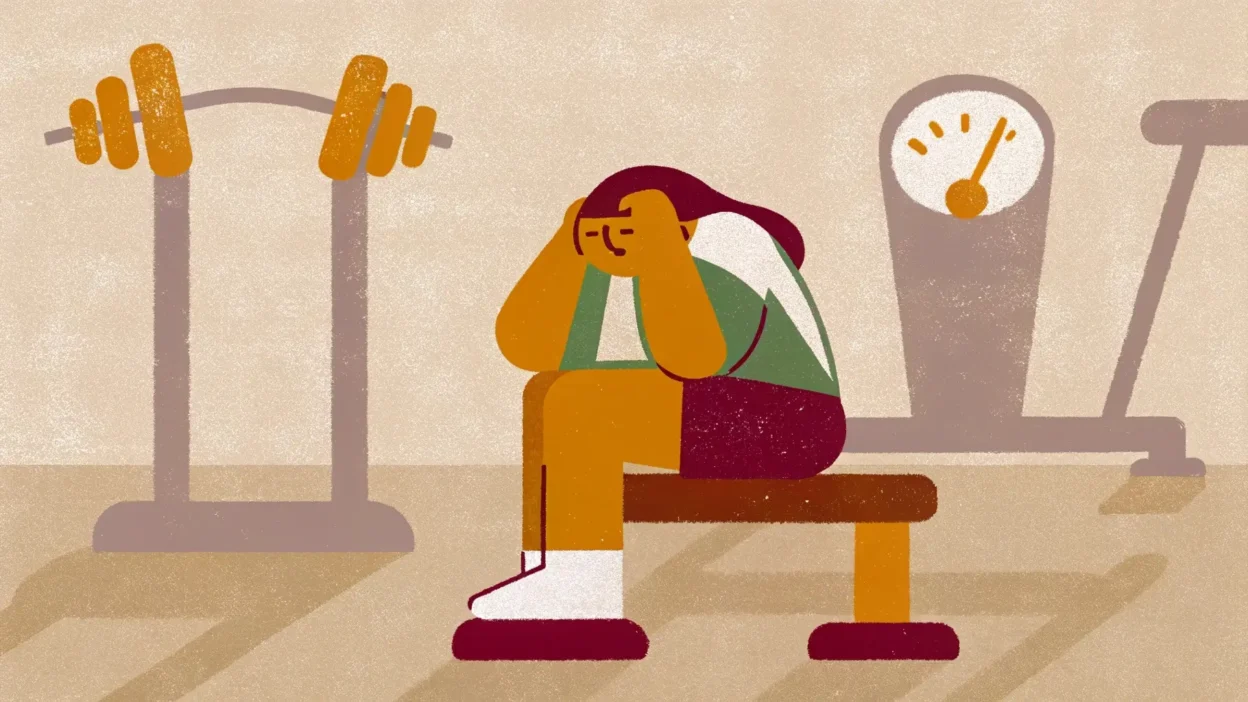Not losing weight despite working out? You’re crushing it at the gym. Sweat dripping, heart pounding, muscles burning—you’re doing everything right. Yet the scale refuses to budge. Sound familiar?
Welcome to one of fitness’s most maddening mysteries. If you’re asking “why am I not losing weight exercising?” You’re not alone in this struggle, and more importantly, you’re not crazy. This weight loss plateau workout frustration affects millions, and exercise not helping weight loss is more common than you think. There’s actual science behind why your body seems to be conspiring against your weight loss goals, even when you’re putting in the work.

Let me paint you a picture: Sarah, a marketing exec I know, was hitting the gym five days a week for three months straight. Cardio, weights, the works. The scale? Stubborn as a mule. Meanwhile, her colleague Mark started working out around the same time and dropped 15 pounds like it was nothing. What gives?
Here’s the thing—not losing weight despite working out isn’t just about burning calories through exercise. It’s a complex dance between your metabolism, hormones, sleep patterns, stress levels, and yes, what you’re putting on your plate. Today, we’re going to dissect exactly why am I not losing weight exercising and, more importantly, how to fix it.

Table of Contents
Why Am I Not Losing Weight Exercising? The Calorie Balance Truth
Let’s start with the elephant in the room: calorie balance and weight loss. The age-old wisdom says “calories in, calories out,” but your body isn’t a simple calculator.
According to Nike’s fitness experts, one of the primary reasons people don’t see results is underestimating calorie intake while overestimating calorie burn. That 45-minute spin class? You might think you torched 600 calories, but reality check—it’s probably closer to 400.
Meanwhile, that “small” post-workout smoothie could easily pack 500 calories. See the problem?
The Real Calorie Trap:
- Restaurant portions are typically 2-3x larger than actual serving sizes
- Liquid calories (smoothies, sports drinks, that extra shot in your coffee) add up fast
- Your fitness tracker might overestimate calorie burn by 15-25%
But here’s where it gets interesting. Your body is smarter than you think. When you start exercising regularly, it begins to adapt, becoming more efficient at conserving energy. This is called metabolic adaptation, and it’s completely normal—but also completely frustrating.
The Cortisol Connection: When Stress Sabotages Your Success
Ever notice how some people seem to gain weight during stressful periods, even when they’re working out religiously? Meet cortisol, your body’s primary stress hormone, and sometimes your weight loss nemesis.
Cortisol and weight gain form a vicious cycle that many fitness enthusiasts don’t see coming. When you’re stressed—whether from work deadlines, relationship drama, or ironically, intense workout routines—your cortisol levels spike.
High cortisol doesn’t just make you crave comfort food (hello, late-night ice cream sessions). This creates a perfect storm where exercise not helping weight loss becomes your reality, even when you’re doing everything “right.” It actually:
- Promotes fat storage, especially around your midsection
- Increases appetite and cravings for high-calorie foods
- Can slow down your metabolism
- Interferes with sleep quality
Research highlighted by Medanta shows that chronic stress can significantly impact weight loss efforts, even when exercise routines are consistent.
Quick Cortisol Control Strategies:
- Practice deep breathing exercises post-workout
- Incorporate yoga or meditation into your routine
- Limit caffeine intake, especially after 2 PM
- Create boundaries between work and personal time
Sleep: The Unsung Hero of Weight Loss
Here’s a truth bomb: the importance of sleep for weight loss cannot be overstated. If you’re grinding through workouts on four hours of sleep, you’re essentially trying to fill a bucket with a giant hole in the bottom. When you’re wondering “why am I not losing weight exercising?” poor sleep might be the culprit. It wreaks havoc on two key hormones:
- Leptin (your “I’m full” hormone) decreases
- Ghrelin (your “I’m hungry” hormone) increases
The result? You’re hungrier, less satisfied after meals, and more likely to reach for high-calorie, processed foods. Plus, your body becomes less efficient at processing glucose, making fat loss significantly harder.
Harvard Health research emphasizes that quality sleep is just as important as exercise for weight management. Aim for 7-9 hours of quality sleep nightly.
The Strength Training Secret: Building Your Metabolic Engine
If you’re only doing cardio, you might be missing the biggest piece of the weight loss puzzle. Strength training for metabolism is like installing a more powerful engine in your car—it makes everything else work better.
Here’s why lifting weights is crucial for weight loss:
| Cardio Only | Cardio + Strength Training |
|---|---|
| Burns calories during exercise | Burns calories during AND after exercise |
| May lead to muscle loss | Preserves and builds muscle mass |
| Metabolism returns to baseline quickly | Elevated metabolism for up to 48 hours post-workout |
| Limited long-term metabolic benefits | Increases resting metabolic rate |
Muscle tissue burns more calories at rest than fat tissue. Every pound of muscle you add increases your daily calorie burn by about 50 calories. That might not sound like much, but over time, it adds up significantly. This is often why people experience a weight loss plateau workout after workout—they’re missing the metabolic boost that only resistance training provides.
According to the American Council on Exercise, strength training can increase your resting metabolic rate by up to 15%.
Breaking Your Weight Loss Plateau Workout: The Overtraining Trap
Exercise not helping weight loss? Plot twist: you might actually be working out too much. Overtraining and weight loss have an inverse relationship that catches many dedicated fitness enthusiasts off guard.
Signs you might be overdoing it:
- Constant fatigue despite adequate sleep
- Decreased performance in workouts
- Increased injury frequency
- Mood swings or irritability
- Plateau or weight gain despite consistent exercise
When you overtrain, your body produces excess cortisol (there’s that stress hormone again), which can actually promote fat storage and muscle breakdown. Your body essentially goes into survival mode, hoarding energy instead of burning it.
Baylor Scott & White Health identifies overexercising as one of the sneakiest saboteurs of weight loss goals.
NEAT: The Hidden Calorie Burner You’re Ignoring
Ever wonder why your naturally thin friend can eat pizza and stay lean while you gain weight just looking at carbs? The secret might be Non-exercise activity thermogenesis (NEAT).
NEAT includes all the calories you burn through daily activities that aren’t formal exercise:
- Fidgeting and gesturing while talking
- Maintaining posture
- Taking the stairs instead of the elevator
- Parking farther away and walking
- Standing instead of sitting during phone calls
Some people naturally have higher NEAT levels, which explains why exercise not helping weight loss affects some more than others, burning an extra 300-800 calories daily without formal exercise. The good news? You can increase your NEAT through simple lifestyle changes.
NEAT-Boosting Strategies:
- Use a standing desk for part of your workday
- Take walking meetings when possible
- Set hourly reminders to move around
- Choose active hobbies (gardening, dancing, playing with pets)
- Take phone calls while walking
Exercise Variety: Breaking the Plateau Pattern
Your body is incredibly adaptive. If you’ve been doing the same workout routine for months, your muscles have become efficient at those specific movements, burning fewer calories over time. This is where exercise variety for fat loss becomes crucial. Breaking through your weight loss plateau workout routine requires strategic variation that challenges your body in new ways.
The Plateau-Busting Protocol:
Week 1-2: High-intensity interval training (HIIT) focus Week 3-4: Strength training emphasis
Week 5-6: Moderate cardio with new activities Week 7-8: Combination training with different rep ranges
High-intensity interval training weight loss benefits are well-documented. HIIT not only burns calories during the workout but creates an “afterburn effect” (excess post-exercise oxygen consumption) that keeps your metabolism elevated for hours afterward.
Sample HIIT workout:
- 30 seconds high-intensity effort
- 90 seconds active recovery
- Repeat for 15-20 minutes
The Hidden Culprits: What You’re Not Considering

Sometimes the reasons you’re not losing weight despite working out have nothing to do with your workout routine. Health.com identifies 13 possible reasons why the scale won’t budge, including several that might surprise you:
Medical Factors:
- Thyroid disorders
- Insulin resistance
- Medications (antidepressants, beta-blockers, steroids)
- Hormonal imbalances (PCOS, menopause)
Lifestyle Factors:
- Alcohol consumption (those weekend cocktails add up)
- Inconsistent meal timing
- Not eating enough protein
- Weekend dietary “freedom” undoing weekday progress
The Body Composition Plot Twist
Here’s something that might blow your mind: you could be losing fat and gaining muscle simultaneously, which means the scale won’t reflect your progress. This is especially common in the first few months of a new exercise routine.
Muscle is denser than fat, so as you build lean mass and lose fat, your body composition improves dramatically even if your weight stays the same. This is why measurements, progress photos, and how your clothes fit are often better indicators than the scale.
Why Am I Not Losing Weight Exercising: The Reality Check
If you’re still asking “why am I not losing weight exercising” remember that your weight loss plateau workout might actually be working—just not in the way you expect. Focus on non-scale victories while addressing the factors above. Sometimes the most significant changes happen beneath the surface before they become visible.
Your Weight Loss Plateau Workout Breakthrough Plan
Ready to break through your weight loss plateau workout routine? Here’s your science-backed strategy:
Week 1-2: Foundation Reset
- Track everything you eat for two weeks (yes, everything)
- Prioritize 7-9 hours of sleep nightly
- Reduce workout frequency if you’re exercising more than 5 days per week
- Add 10 minutes of stress management daily (meditation, deep breathing, journaling)
Week 3-4: Metabolic Boost
- Introduce strength training 2-3x per week if you haven’t already
- Replace one cardio session with HIIT
- Increase daily NEAT activities
- Focus on protein at every meal (aim for 0.8-1g per pound of body weight)
Week 5-6: Fine-Tuning
- Vary your workout routine every 2 weeks
- Consider working with a registered dietitian
- Get blood work done to rule out medical issues
- Reassess and adjust based on progress
Week 7+: Consistency and Patience
- Trust the process (real changes take 8-12 weeks to become noticeable)
- Focus on non-scale victories
- Continue varying your exercise routine
- Maintain healthy lifestyle habits as your new normal
The Bottom Line: It’s Not Just About the Workout
The harsh truth? Exercise not helping weight loss is more common than you think. NIH research confirms that successful weight loss requires a comprehensive approach addressing diet, exercise, sleep, stress management, and sometimes medical factors.
But here’s the empowering part: once you understand why am I not losing weight exercising, you can take targeted action to fix it. Your body isn’t broken—it’s just following its own complex programming.
The most successful people I know don’t just work harder; they work smarter. They understand that weight loss is a puzzle with multiple pieces, and exercise is just one piece of that puzzle.
Your Next Move
Stop beating yourself up about that stubborn scale. Instead, take a step back and honestly assess which factors might be sabotaging your progress. Are you getting enough sleep? Managing stress effectively? Eating enough protein? Varying your workouts?
Pick one area from this article that resonated with you and focus on improving it for the next two weeks. Small, consistent changes compound over time into dramatic results.
Remember, the goal isn’t just to lose weight—it’s to build a sustainable, healthy lifestyle that supports your long-term well-being. Sometimes that means the scale moves slower than we’d like, but your body is changing in ways that matter far more than a number.
Your breakthrough is coming. Trust the process, stay consistent, and give your body the time it needs to respond to all the good work you’re putting in.
Sources
This article is backed by research from leading health institutions and fitness experts:
- Nike Training – “6 reasons you’re exercising but not seeing results” – Nike.com
- Medanta Healthcare – “The Real Reason You’re Not Losing Weight In spite of Exercising” – Medanta.org
- Baylor Scott & White Health – “Why am I not losing weight? 6 sneaky reasons sabotaging your weight loss goals” – BSWHealth.com
- National Institutes of Health (NIH) – “What could be the reasons for not losing weight even after following a weight loss program?” – PMC.NCBI.NLM.NIH.gov
- Health.com – “Why Am I Not Losing Weight? 13 Possible Reasons” – Health.com
- Harvard Health Publishing – “Why exercise if I’m not losing weight?” – Health.Harvard.edu
- American Council on Exercise – Strength Training and Metabolic Rate Research – ACEFitness.org
Frequently Asked Questions
1. How long should I wait before expecting weight loss results from working out?
Most people start seeing noticeable results after 4-6 weeks of consistent exercise and proper nutrition. However, your body composition may begin changing within 2-3 weeks, even if the scale doesn’t reflect it immediately. Remember, building muscle while losing fat can mask weight loss progress.
2. Can I lose weight with exercise alone, without changing my diet?
While exercise is crucial for overall health, not losing weight despite working out often comes down to diet. Research shows that weight loss is approximately 70% diet and 30% exercise. You can’t out-exercise a poor diet—creating a caloric deficit through both diet and exercise yields the best results.
3. Why do I gain weight when I start a new workout routine?
Initial weight gain when starting exercise is completely normal and usually temporary. This happens due to:
- Muscle inflammation and water retention for repair
- Increased glycogen storage in muscles
- Building lean muscle mass (which weighs more than fat)
- Hormonal adjustments to your new routine
4. How often should I change my workout routine to avoid plateaus?
To prevent weight loss plateau workout issues, vary your routine every 4-6 weeks. This doesn’t mean completely overhauling everything—simple changes like adjusting rep ranges, trying new exercises, or switching between HIIT and steady-state cardio can reignite progress.
5. What’s the biggest mistake people make when trying to lose weight through exercise?
The biggest mistake is focusing solely on cardio while neglecting strength training. Many people also underestimate their calorie intake and overestimate their calorie burn. Additionally, not getting adequate sleep and managing stress levels can sabotage even the most dedicated workout routine.
What’s your biggest takeaway from this article? Have you experienced not losing weight despite working out in your own fitness journey?






[…] SHOCKING Truth: 5 Science-Backed Reasons You’re NOT Losing Weight Despite Working Out (And How to … […]